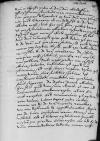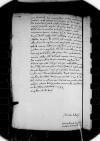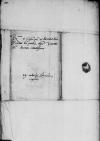Cum quaererem diligentius ex reverendissimo Samuel Maciejowski (*1499 – †1550), humanist and diplomat, one of the most trusted advisors to King Sigismund I and then to his son Sigismund II Augustus; from 1521 Canon of the Collegiate Chapter in Sandomierz, and from 1530 in Kielce; from 1531 Canon of Gniezno; from 1532 or 1533 to 1537 royal secretary (previously scribe at the royal chancellery); 1537-1539 Grand Secretary; 1539-1547 Crown Vice-Chancellor; 1539-1541 Bishop of Chełm; 1541-1545 Bishop of Płock; 1545-1550 Bishop of Cracow; 1547-1550 Crown Grand Chancellor; in 1532 royal envoy to Rome; in 1534 and 1538 royal envoy to the local diets (WYCZAŃSKI 1990, p. 257-258; Urzędnicy 10, p. 184; PSB 19 Machowski - Maria Kazimiera, p. 64-69)⌊domino meo PlocensiSamuel Maciejowski (*1499 – †1550), humanist and diplomat, one of the most trusted advisors to King Sigismund I and then to his son Sigismund II Augustus; from 1521 Canon of the Collegiate Chapter in Sandomierz, and from 1530 in Kielce; from 1531 Canon of Gniezno; from 1532 or 1533 to 1537 royal secretary (previously scribe at the royal chancellery); 1537-1539 Grand Secretary; 1539-1547 Crown Vice-Chancellor; 1539-1541 Bishop of Chełm; 1541-1545 Bishop of Płock; 1545-1550 Bishop of Cracow; 1547-1550 Crown Grand Chancellor; in 1532 royal envoy to Rome; in 1534 and 1538 royal envoy to the local diets (WYCZAŃSKI 1990, p. 257-258; Urzędnicy 10, p. 184; PSB 19 Machowski - Maria Kazimiera, p. 64-69)⌋, num quid litterarum ad me dedisset Reverendissima Dominatio Vestra, oblatae mihi sunt hac ipsa hora, quibus vereor, ut per festinationem cubicularii respondere possim. Responsi regii miror, si aliud exemplum habet reverendissimus Tiedemann Giese (Tidemannus Gisius) (*1480 – †1550), in 1519 ennobled by King Sigismund I; 1504-1538 Canon of Ermland (Warmia); 1516-1527, 1533-1537 Judicial Vicar and Vicar General of Ermland; 1523-1538 Custos of Ermland; 1537-1549 Bishop of Kulm (Chełmno); 1549-1550 Bishop of Ermland (BORAWSKA 1984, passim)⌊dominus CulmensisTiedemann Giese (Tidemannus Gisius) (*1480 – †1550), in 1519 ennobled by King Sigismund I; 1504-1538 Canon of Ermland (Warmia); 1516-1527, 1533-1537 Judicial Vicar and Vicar General of Ermland; 1523-1538 Custos of Ermland; 1537-1549 Bishop of Kulm (Chełmno); 1549-1550 Bishop of Ermland (BORAWSKA 1984, passim)⌋, quam quod datum est per me Reverendissimae Dominationi Vestrae, aut quo errore factum sit, quod Albrecht I von Hohenzollern-Ansbach (Albrecht von Brandenburg) (*1490 – †1568), 1511-1525 Grand Master of the Teutonic Order; from 1525 to his death Duke in Prussia as a liegeman of the Polish king; son of Friedrich V of Brandenburg der Ältere and Sophia Jagiellon (daughter of Casimir IV Jagiellon), nephew of Sigismund I, King of Poland; founder of the university in Königsberg (1544)⌊viciniAlbrecht I von Hohenzollern-Ansbach (Albrecht von Brandenburg) (*1490 – †1568), 1511-1525 Grand Master of the Teutonic Order; from 1525 to his death Duke in Prussia as a liegeman of the Polish king; son of Friedrich V of Brandenburg der Ältere and Sophia Jagiellon (daughter of Casimir IV Jagiellon), nephew of Sigismund I, King of Poland; founder of the university in Königsberg (1544)⌋ nomen perscriptum ibi sit, quod ego tollendum ex consilio Reverendissimae Dominationis Vestrae curaveram.
De schola numquam mihi suboluit privatae rei consuli, non publicae. Tanto magis gaudeo non cessisse illis ex sententia. Laboratum est apud me plurimum, sed mihi semper iniquum visum est monasterium suis fructibus spoliari. Ut consiliariis tutela committatur, cum opportunum fuerit, suggeram.
De Jan Benedyktowicz Solfa (Ioannes Benedicti de Trebul, Ioannes Benedicti Solpha) (*1483 – †1564), physician, lawyer, poet and historian; in 1541 ennobled by Emperor Charles V of Habsburg; from 1521 Canon of the Collegiate Chapter in Glogau (Głogów); from 1522 court physician of King Sigismund I Jagiellon; from 1526 Canon of Ermland (Warmia); from ca. 1528 Canon of Vilnius; from 1529 Canon of St. John’s Collegiate Church in Warsaw; from 1531 Custos of Łowicz; from 1538 Canon of Wrocław (Breslau); from 1539 Canon of Sandomierz; from 1547 Canon of Cracow and Provost of Ermland (KOŻUSZEK, passim)⌊doctore IoanneJan Benedyktowicz Solfa (Ioannes Benedicti de Trebul, Ioannes Benedicti Solpha) (*1483 – †1564), physician, lawyer, poet and historian; in 1541 ennobled by Emperor Charles V of Habsburg; from 1521 Canon of the Collegiate Chapter in Glogau (Głogów); from 1522 court physician of King Sigismund I Jagiellon; from 1526 Canon of Ermland (Warmia); from ca. 1528 Canon of Vilnius; from 1529 Canon of St. John’s Collegiate Church in Warsaw; from 1531 Custos of Łowicz; from 1538 Canon of Wrocław (Breslau); from 1539 Canon of Sandomierz; from 1547 Canon of Cracow and Provost of Ermland (KOŻUSZEK, passim)⌋ allatum huc fuit, quod diem suum obierit, et iam ad canonicatum Sandomiriensem alius hic erat receptus, sed renuntiatum est postea eum vivere. Litteras regias contra Anna Wachsschlagerin (Anna Woszczkowa) (†before 1547-03)⌊CeritamAnna Wachsschlagerin (Anna Woszczkowa) (†before 1547-03)⌋ memini me Reverendissimae Dominationi Vestrae Cracow (Kraków, Cracovia), city in southern Poland, Małopolska, on the Vistula river, from 1038 capital of the Kingdom of Poland⌊CracoviaCracow (Kraków, Cracovia), city in southern Poland, Małopolska, on the Vistula river, from 1038 capital of the Kingdom of Poland⌋ remittere una cum diplomate de appellationibus idque per dominum Mikołaj Loka (Mikołaj Lok) (†1569), collaborator of Stanisław Hozjusz as a royal secretary; in 1545-1547 he stayed in Rome; 1540 Ermland canon; 1547 - Poznań; 1560 abbot of the Cistercian monastery in Oliwa; 1550 envoy to the Prussian diet on behalf of King Sigismund II August (SZORC 1990, p. 331; KOPICZKO 2, p. 201)⌊LoccaMikołaj Loka (Mikołaj Lok) (†1569), collaborator of Stanisław Hozjusz as a royal secretary; in 1545-1547 he stayed in Rome; 1540 Ermland canon; 1547 - Poznań; 1560 abbot of the Cistercian monastery in Oliwa; 1550 envoy to the Prussian diet on behalf of King Sigismund II August (SZORC 1990, p. 331; KOPICZKO 2, p. 201)⌋ confratrem meum. Miror, si non reddidit. Sed et litteras restitutionis pupilli miseram per quendam Gedanensem, cui ad Reverendissimam Dominationem Vestram commendaticias dederam. Nomen mihi  BCz 1618, p. 498 non succurrit. De commissione contra Anna Wachsschlagerin (Anna Woszczkowa) (†before 1547-03)⌊CeritamAnna Wachsschlagerin (Anna Woszczkowa) (†before 1547-03)⌋ non memini mihi quicquam scribere Reverendissimam Dominationem Vestram. De inventario curae mihi futurum est, nisi quod nomen pupilli nescio et quae scripta in causa habebam, Cracow (Kraków, Cracovia), city in southern Poland, Małopolska, on the Vistula river, from 1038 capital of the Kingdom of Poland⌊CracoviaeCracow (Kraków, Cracovia), city in southern Poland, Małopolska, on the Vistula river, from 1038 capital of the Kingdom of Poland⌋ reliqui{o} neque satis memoria teneo.
BCz 1618, p. 498 non succurrit. De commissione contra Anna Wachsschlagerin (Anna Woszczkowa) (†before 1547-03)⌊CeritamAnna Wachsschlagerin (Anna Woszczkowa) (†before 1547-03)⌋ non memini mihi quicquam scribere Reverendissimam Dominationem Vestram. De inventario curae mihi futurum est, nisi quod nomen pupilli nescio et quae scripta in causa habebam, Cracow (Kraków, Cracovia), city in southern Poland, Małopolska, on the Vistula river, from 1038 capital of the Kingdom of Poland⌊CracoviaeCracow (Kraków, Cracovia), city in southern Poland, Małopolska, on the Vistula river, from 1038 capital of the Kingdom of Poland⌋ reliqui{o} neque satis memoria teneo.
Litterae Reverendissimae Dominationis Vestrae apertae per Samuel Maciejowski (*1499 – †1550), humanist and diplomat, one of the most trusted advisors to King Sigismund I and then to his son Sigismund II Augustus; from 1521 Canon of the Collegiate Chapter in Sandomierz, and from 1530 in Kielce; from 1531 Canon of Gniezno; from 1532 or 1533 to 1537 royal secretary (previously scribe at the royal chancellery); 1537-1539 Grand Secretary; 1539-1547 Crown Vice-Chancellor; 1539-1541 Bishop of Chełm; 1541-1545 Bishop of Płock; 1545-1550 Bishop of Cracow; 1547-1550 Crown Grand Chancellor; in 1532 royal envoy to Rome; in 1534 and 1538 royal envoy to the local diets (WYCZAŃSKI 1990, p. 257-258; Urzędnicy 10, p. 184; PSB 19 Machowski - Maria Kazimiera, p. 64-69)⌊reverendissimum dominumSamuel Maciejowski (*1499 – †1550), humanist and diplomat, one of the most trusted advisors to King Sigismund I and then to his son Sigismund II Augustus; from 1521 Canon of the Collegiate Chapter in Sandomierz, and from 1530 in Kielce; from 1531 Canon of Gniezno; from 1532 or 1533 to 1537 royal secretary (previously scribe at the royal chancellery); 1537-1539 Grand Secretary; 1539-1547 Crown Vice-Chancellor; 1539-1541 Bishop of Chełm; 1541-1545 Bishop of Płock; 1545-1550 Bishop of Cracow; 1547-1550 Crown Grand Chancellor; in 1532 royal envoy to Rome; in 1534 and 1538 royal envoy to the local diets (WYCZAŃSKI 1990, p. 257-258; Urzędnicy 10, p. 184; PSB 19 Machowski - Maria Kazimiera, p. 64-69)⌋ mihi sunt redditae. Erat in illis scheda, in qua de novis fit mentio. Quae tamen hidden by binding⌈[n]n hidden by binding⌉ illa fuerint, nescio, nam perscripta non reperi. Illud mirari satis non possum esse, qui ne hoc quidem ferre possint, ut ad cancellariam novae res perscribantur, ad quam olim referebantur omnia. Adeo soli volunt rerum omnium potiri.
De novis rebus deque Diet of Poland ⌊comitiisDiet of Poland ⌋ ex Samuel Maciejowski (*1499 – †1550), humanist and diplomat, one of the most trusted advisors to King Sigismund I and then to his son Sigismund II Augustus; from 1521 Canon of the Collegiate Chapter in Sandomierz, and from 1530 in Kielce; from 1531 Canon of Gniezno; from 1532 or 1533 to 1537 royal secretary (previously scribe at the royal chancellery); 1537-1539 Grand Secretary; 1539-1547 Crown Vice-Chancellor; 1539-1541 Bishop of Chełm; 1541-1545 Bishop of Płock; 1545-1550 Bishop of Cracow; 1547-1550 Crown Grand Chancellor; in 1532 royal envoy to Rome; in 1534 and 1538 royal envoy to the local diets (WYCZAŃSKI 1990, p. 257-258; Urzędnicy 10, p. 184; PSB 19 Machowski - Maria Kazimiera, p. 64-69)⌊reverendissimi dominiSamuel Maciejowski (*1499 – †1550), humanist and diplomat, one of the most trusted advisors to King Sigismund I and then to his son Sigismund II Augustus; from 1521 Canon of the Collegiate Chapter in Sandomierz, and from 1530 in Kielce; from 1531 Canon of Gniezno; from 1532 or 1533 to 1537 royal secretary (previously scribe at the royal chancellery); 1537-1539 Grand Secretary; 1539-1547 Crown Vice-Chancellor; 1539-1541 Bishop of Chełm; 1541-1545 Bishop of Płock; 1545-1550 Bishop of Cracow; 1547-1550 Crown Grand Chancellor; in 1532 royal envoy to Rome; in 1534 and 1538 royal envoy to the local diets (WYCZAŃSKI 1990, p. 257-258; Urzędnicy 10, p. 184; PSB 19 Machowski - Maria Kazimiera, p. 64-69)⌋ litteris cognoscet. Scripsi et ego ante biduum per hidden by binding⌈[r]r hidden by binding⌉ Stanisław Kostka (*1487 – †1555), as a leader of the so-called nobles' party active in Royal Prussia since 1536, Kostka stood in opposition to most of the members of the Council of Royal Prussia, who wanted to maintain the autonomy of the province and a "balance of power" in terms of governance. The tension between the Prussian Subtreasurer and the Council had been increasing since the Diet in Graudenz (Grudziądz) in 1533. Kostka, connected with the royal court since his youth, was sent to Graudenz as the King's deputy and, contrary to custom, decided to take part in the proceedings. In response to such a step, the Council members stopped the meeting. Kostka accused them of hostility towards the Poles and intervened on this matter at the court. In the absence of the then Bishop of Ermland (Mauritius Ferber) it was Dantiscus who chaired the Graudenz Diet. The incident badly harmed his future relationships with Kostka; 1531-1555 Treasurer of the Prussian lands and Treasurer of Marienburg (Malbork); 1544-1545 Castellan of Elbing (Elbląg), 1545-1546 Castellan of Kulm (Chełmno); 1546-1549 Vice-Voivode of Kulm; 1546-1551 Voivode of Pomerania; 1551-1555 Voivode of Kulm (PSB 14, p. 356; Urzędnicy 5/2, p. 216; MAŁŁEK 1976, p. 119-123)⌊domini thesaurariiStanisław Kostka (*1487 – †1555), as a leader of the so-called nobles' party active in Royal Prussia since 1536, Kostka stood in opposition to most of the members of the Council of Royal Prussia, who wanted to maintain the autonomy of the province and a "balance of power" in terms of governance. The tension between the Prussian Subtreasurer and the Council had been increasing since the Diet in Graudenz (Grudziądz) in 1533. Kostka, connected with the royal court since his youth, was sent to Graudenz as the King's deputy and, contrary to custom, decided to take part in the proceedings. In response to such a step, the Council members stopped the meeting. Kostka accused them of hostility towards the Poles and intervened on this matter at the court. In the absence of the then Bishop of Ermland (Mauritius Ferber) it was Dantiscus who chaired the Graudenz Diet. The incident badly harmed his future relationships with Kostka; 1531-1555 Treasurer of the Prussian lands and Treasurer of Marienburg (Malbork); 1544-1545 Castellan of Elbing (Elbląg), 1545-1546 Castellan of Kulm (Chełmno); 1546-1549 Vice-Voivode of Kulm; 1546-1551 Voivode of Pomerania; 1551-1555 Voivode of Kulm (PSB 14, p. 356; Urzędnicy 5/2, p. 216; MAŁŁEK 1976, p. 119-123)⌋ famulum. Interea nihil accidit hidden by binding⌈[t]t hidden by binding⌉ scriptu dignum, nisi quo proelio decertaturi nostri cum The Ottoman Turks (Turcae) ⌊TurcisThe Ottoman Turks (Turcae) ⌋ feruntur. Deus Christianorum consilia secundet. Quem precor, ut Vestram Reverendissimam dominationem diu servet incolumem. Cuius me gratiae etiam atque etiam diligenter commendo.
 BCz 1618, p. 498 non succurrit. De commissione contra
BCz 1618, p. 498 non succurrit. De commissione contra 

